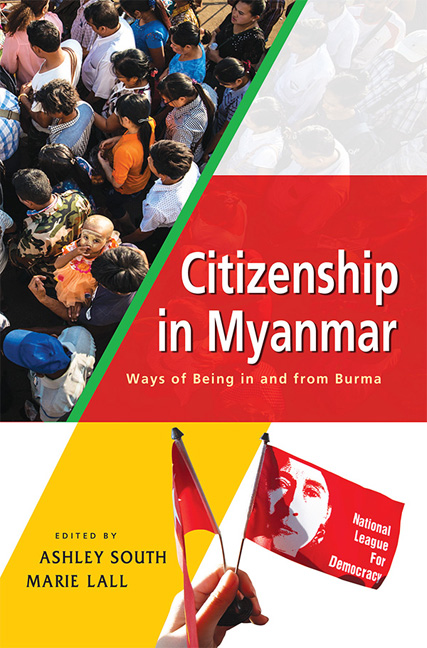Book contents
- Frontmatter
- Dedication
- Contents
- Foreword
- The Contributors
- Map of Myanmar
- Introduction
- 1 Ethnic Politics and Citizenship in History
- 2 Representation and Citizenship in the Future Integration of Ethnic Armed Actors in Myanmar/Burma
- Special Contribution: The Way Forward for Peace, Stability and Progress in Burma/Myanmar
- 3 National Political Dialogue and Practices of Citizenship in Myanmar
- 4 Citizenship and Minority Rights: The Role of “National Race Affairs” Ministers in Myanmar's 2008 Constitution
- Special Contribution: Karenni People at a Glance
- 5 Myanmar's Youth and the Question of Citizenship
- Special Contribution: I Am a Citizen of Myanmar
- 6 “The Value of Life”: Citizenship, Entitlement and Moral Legibility in Provincial Myanmar
- Special Contribution: How I Became Shan
- 7 Conflict and Mass Violence in Arakan (Rakine State): The 1942 Events and Political Identity Formation
- 8 Exploring the Issue of Citizenship in Rakhine State
- Special Contribution: Rohingya and Nationality Status in Myanmar
- 9 Myanmar's Other Muslims: The Case of the Kaman
- Special Contribution: Interview with P'doh Kweh Htoo Win
- Index
1 - Ethnic Politics and Citizenship in History
Published online by Cambridge University Press: 28 June 2018
- Frontmatter
- Dedication
- Contents
- Foreword
- The Contributors
- Map of Myanmar
- Introduction
- 1 Ethnic Politics and Citizenship in History
- 2 Representation and Citizenship in the Future Integration of Ethnic Armed Actors in Myanmar/Burma
- Special Contribution: The Way Forward for Peace, Stability and Progress in Burma/Myanmar
- 3 National Political Dialogue and Practices of Citizenship in Myanmar
- 4 Citizenship and Minority Rights: The Role of “National Race Affairs” Ministers in Myanmar's 2008 Constitution
- Special Contribution: Karenni People at a Glance
- 5 Myanmar's Youth and the Question of Citizenship
- Special Contribution: I Am a Citizen of Myanmar
- 6 “The Value of Life”: Citizenship, Entitlement and Moral Legibility in Provincial Myanmar
- Special Contribution: How I Became Shan
- 7 Conflict and Mass Violence in Arakan (Rakine State): The 1942 Events and Political Identity Formation
- 8 Exploring the Issue of Citizenship in Rakhine State
- Special Contribution: Rohingya and Nationality Status in Myanmar
- 9 Myanmar's Other Muslims: The Case of the Kaman
- Special Contribution: Interview with P'doh Kweh Htoo Win
- Index
Summary
Different perceptions over identity, politics and citizenship have continued throughout Myanmar/Burma's modern history. Such differences were partially structured during the colonial era of government, and they have diversified into new forms since independence in 1948 as a host of different state and non-state actors have struggled to achieve a national political system that reflects the aspirations and identities of all peoples. Failure in the accomplishment of such a fundamental task has underpinned the legacy of ethnic conflict and state failure that continues to face the country. Into the twenty-first century, the national landscape has remained divided. While the national armed forces, known as the Tatmadaw, have come to dominate government and unitary political systems in the centre of the country, a variety of ethnic-based opposition groups have kept alive very different visions of identity, citizenship and statehood in the surrounding borderlands.
Since 2011, a new multi-ethnic, multi-party political system is being introduced through such elements as ethnic peace talks, parliamentary politics and constitutional reform. The advent to government of the National League for Democracy (NLD) in March 2016 provides further momentum to the processes of change. As dialogue takes place, this is bringing on to the national stage differences of opinion and deep crises in ethnic politics that have long needed to be addressed if national peace and stability are to be achieved.
Political transition, however, is neither prescriptive nor a one-way street. As steps towards democracy continue, the difficulties in achieving solutions have been compounded as long-standing crises reveal new complexities or, in some cases, even worsen. Setbacks in ethnic politics during the past six years include a resurgence of armed conflict in the Kachin State and Kachin, Kokang, Shan and Ta-ang (Palaung) regions of the Northern Shan State; Buddhist–Muslim violence that has spread from the Rakhine State to other parts of the country; disenfranchisement from voting rights or citizenship for over million people of perceived Indian or Chinese ancestry; accelerating land-grabbing and competition for the control of natural resources; and the displacement of a further 350,000 civilians from their homes in the Kachin, Rakhine and Shan States.
Clearly, political transition from Tatmadaw-based government is still at a beginning, not at an end. It is vital, therefore, that in the coming years the root causes of the political conflicts and disagreements that have long divided the country are recognized and addressed.
- Type
- Chapter
- Information
- Citizenship in MyanmarWays of Being in and from Burma, pp. 26 - 58Publisher: ISEAS–Yusof Ishak InstitutePrint publication year: 2017

